Financial System Adaptability and Resilience
Financial systems differ across countries and tend to evolve slowly over time. Their structure is typically stable, but their resilience is often tested. A well-functioning financial system is vital for economic development, as it ensures that capital flows to the most productive and valuable investment opportunities. However, systemic vulnerabilities can have far-reaching consequences. For example, the 2007–08 global financial crisis emerged from within the financial sector itself when complex financial products fuelled a credit bubble in the U.S. housing market, threatening global economic stability when the bubble burst. That event led to extensive policy and regulatory reforms to strengthen financial system resilience.
Financial systems continue to face significant challenges. External shocks like the COVID-19 pandemic, the climate crisis, the green economic transition, and the energy crisis driven by geopolitical conflict all underscore the importance of financial systems that can absorb shocks and adapt to changing economic conditions. Motivated by these pressing issues, we investigate how financial systems respond to crises, which institutions and policies improve resilience, and the role of finance systems' setup in broader economic transformations. We use diverse data sources, including bank and firm-level data, regulatory reports, and house price and election data, to inform evidence-based policy.
Research Cluster
Financial Resilience and RegulationYour contact

- Department Financial Markets
EXTERNAL FUNDING
08.2022 ‐ 07.2025
OVERHANG: Debt overhang and green investments - the role of banks in climate-friendly management of emission-intensive fixed assets
The collaborative project “Debt Overhang and Green Investments” (OVERHANG) aims to investigate the role of banks in the climate-friendly management of emission-intensive fixed assets. This will identify policy-relevant insights on financial regulation, government-controlled lending and financial stability, as well as raise awareness among indebted stakeholders.
01.2015 ‐ 12.2019
Interactions between Bank-specific Risk and Macroeconomic Performance
07.2016 ‐ 12.2018
Relationship Lenders and Unorthodox Monetary Policy: Investment, Employment, and Resource Reallocation Effects
Leibniz Association
We combine a number of unique and proprietary data sources to measure the impact of relationship lenders and unconventional monetary policy during and after the European sovereign debt crisis on the real economy. Establishing systematic links between different research data centers (Forschungsdatenzentren, FDZ) and central banks with detailed micro-level information on both financial and real activity is the stand-alone proposition of our proposal. The main objective is to permit the identification of causal effects, or their absence, regarding which policies were conducive to mitigate financial shocks and stimulate real economic activities, such as employment, investment, or the closure of plants.
Refereed Publications
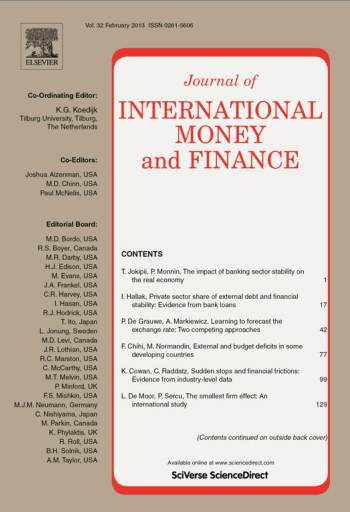
The Diplomacy Discount in Global Syndicated Loans
in: Journal of International Money and Finance, February 2022
Abstract
This paper investigates whether state-to-state political ties with the United States affect the pricing of global syndicated loans. We find that a one-standard-deviation improvement in state political ties between the U.S. and the government of a borrower’s home country is associated with a 14.7 basis points lower loan spread, shaving off about 11.8 million USD in interest payments over the duration of the average loan for borrowers. Results also show that the effect of political ties is stronger for narrower and more concentrated loan syndicates, when lead arrangers are U.S. banks, during periods in which the U.S. is engaged in armed conflicts, when the U.S. president belongs to the Republican Party, and for borrowers with better balance sheets and prior lending relationships. Notably, not all firms benefit equally, as cross-listed firms and firms in countries with strong institutional quality and ability to attract institutional investors are much less affected by political ties.
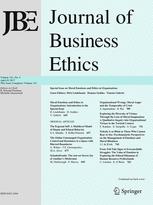
Do Banks Value Borrowers' Environmental Record? Evidence from Financial Contracts
in: Journal of Business Ethics, December 2021
Abstract
Banks play a unique role in society. They not only maximize profits but also consider the interests of stakeholders. We investigate whether banks consider firms’ pollution records in their lending decisions. The evidence shows that banks offer significantly higher loan spreads, higher total borrowing costs, shorter loan maturities, and greater collateral to firms with higher levels of chemical pollution. The costly effects are stronger for borrowers with greater risk and weaker corporate governance. Further, the results show that banks with higher social responsibility account for their borrowers’ environmental performance and charge higher loan spreads to those with poor performance. These results support the idea that banks with higher social responsibility can promote the practice of business ethics in firms.
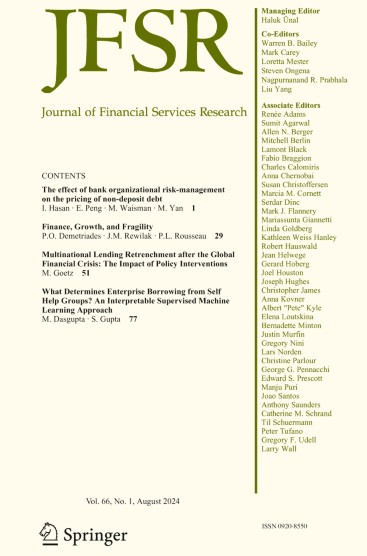
Political Uncertainty and Bank Loan Contracts: Does Government Quality Matter?
in: Journal of Financial Services Research, December 2021
Abstract
We investigate the relation between political uncertainty and bank loan spreads using a sample of loan contracts for the G20 firms during the period from 1982 to 2015. We find that banks charge firms higher loan spreads and require more covenants during election years when domestic political risks are elevated. Greater differences in the support ratios of opinion polls on candidates lead to the lower cost of bank loans. This political effect also lessens when the government quality of the borrower’s country is better than that of the lender’s country. Better quality government can lower the political risk component of bank loan spreads.
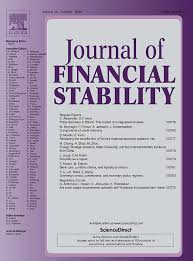
The Impact of Political Uncertainty on Institutional Ownership
in: Journal of Financial Stability, December 2021
Abstract
This paper provides original evidence from institutional investors that political uncertainty greatly affects investment behavior. Using institutional holdings of common stock, we find that institutions significantly reduce their holdings by 0.8–2.3% points during presidential election years. Such effect holds for gubernatorial elections with cross-state-border difference-in-difference analysis and for tests using a political uncertainty index. The effect is the opposite for American Depository Receipts (ADRs). In addition, we find that institutions benefit financially from the observed strategy, and such strategy is in line with predicted outcomes of presidential election polls.

Banking Globalization, Local Lending, and Labor Market Effects: Micro-level Evidence from Brazil
in: Journal of Financial Stability, October 2021
Abstract
Recent financial crises have prompted the interest in understanding how banking globalization interacts with domestic institutions in shaping foreign shocks’ transmission. This paper uses regional banking data from Brazil to show that a foreign funding shock to banks negatively affects lending by their regional branches. This effect increases in the presence of frictions in internal capital markets, which affect branches’ capacity to access funding from other regions via intra-bank linkages. These results also matter on an aggregate level, as municipality-level credit and job flows drop in exposed regions. Policies aiming to reduce the fragmented structure of regional banking markets could moderate the propagation of foreign shocks.
Working Papers

Ecological Preferences and the carbon Intensity of Corporate Investment
in: IWH Discussion Papers, No. 2, 2025
Abstract
<p>Lowering carbon intensity in manufacturing is necessary to transform current production technologies. We test if local agents’ preferences, revealed by vote shares for the Green party during local elections in Germany, relate to the carbon intensity of investments in production technologies. Our sample comprises all investment choices made by manufacturing establishments from 2005-2017. Our results suggest that ecological preferences correlate with significantly fewer carbon-intensive investment projects while investments stimulating growth and reducing carbon emissions increase by 14 percentage points. Both results are more distinct in federal states where the Green Party enjoys political power and local ecological preferences are high.</p>
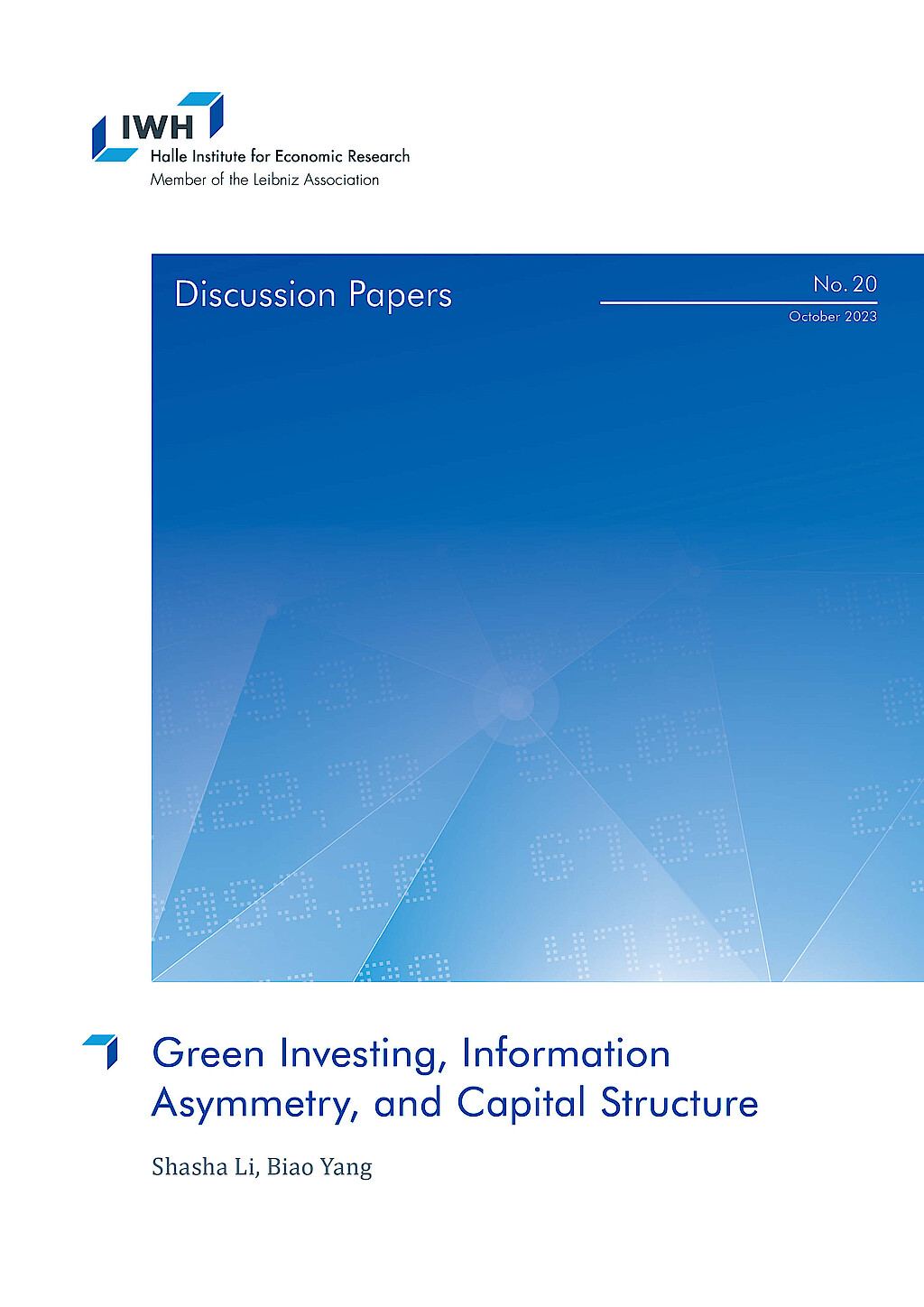
Green Investing, Information Asymmetry, and Capital Structure
in: IWH Discussion Papers, No. 20, 2023
Abstract
We investigate how optimal attention allocation of green-motivated investors changes information asymmetry in financial markets and thus affects firms‘ financing costs. To guide our empirical analysis, we propose a model where investors with heterogeneous green preferences endogenously allocate limited attention to learn market-level or firm-specific fundamental shocks. We find that a higher fraction of green investors in the market leads to higher aggregate attention to green firms. This reduces the information asymmetry of green firms, leading to higher price informativeness and lower leverage. Moreover, the information asymmetry of brown firms and the market increases with the share of green investors. Therefore, greater green attention is associated with less market efficiency. We provide empirical evidence to support our model predictions using U.S. data. Our paper shows how the growing demand for sustainable investing shifts investors‘ attention and benefits eco-friendly firms.
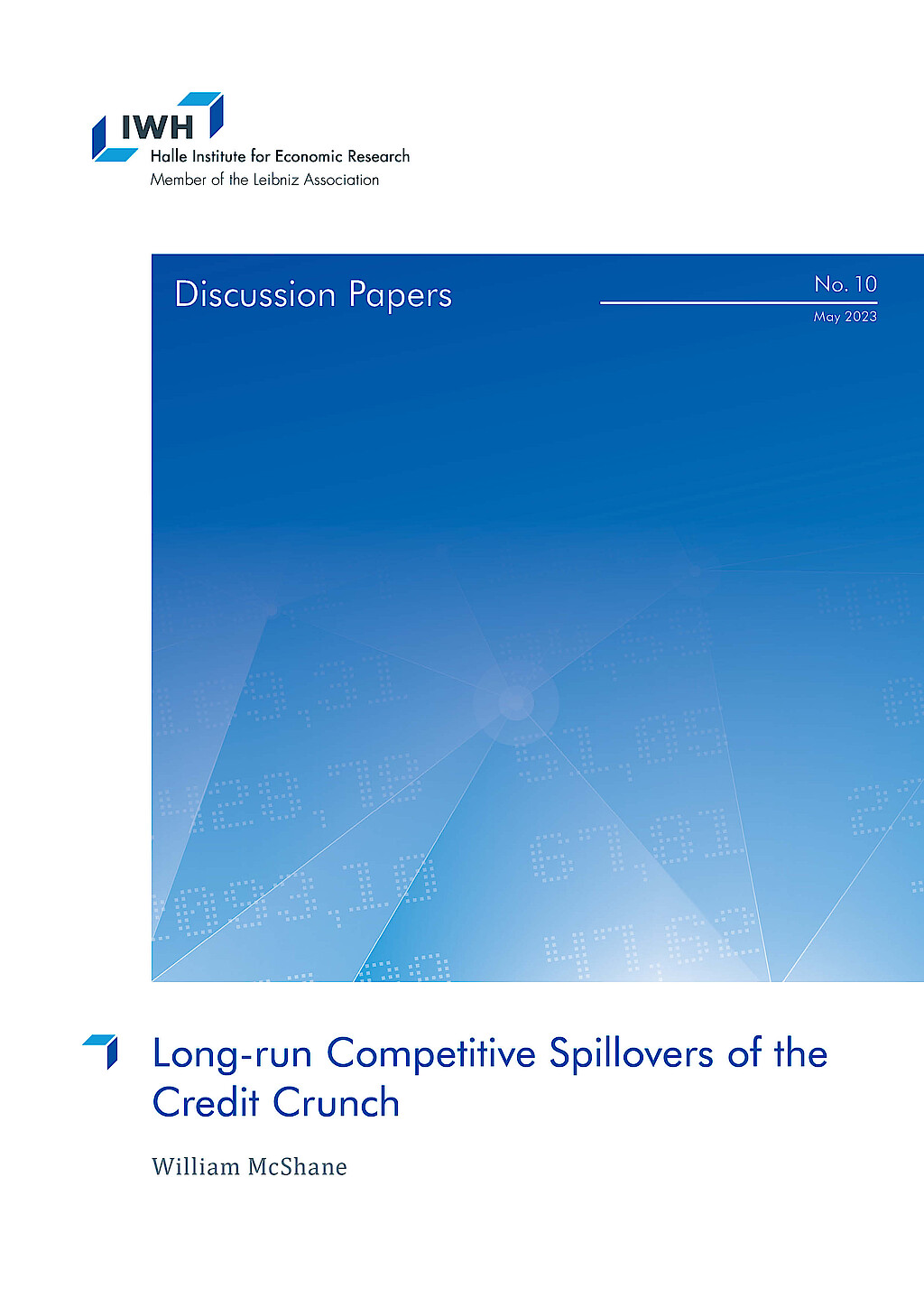
Long-run Competitive Spillovers of the Credit Crunch
in: IWH Discussion Papers, No. 10, 2023
Abstract
Competition in the U.S. appears to have declined. One contributing factor may have been heterogeneity in the availability of credit during the financial crisis. I examine the impact of product market peer credit constraints on long-run competitive outcomes and behavior among non-financial firms. I use measures of lender exposure to the financial crisis to create a plausibly exogenous instrument for product market credit availability. I find that credit constraints of product market peers positively predict growth in sales, market share, profitability, and markups. This is consistent with the notion that firms gained at the expense of their credit constrained peers. The relationship is robust to accounting for other sources of inter-firm spillovers, namely credit access of technology network and supply chain peers. Further, I find evidence of strategic investment, i.e. the idea that firms increase investment in response to peer credit constraints to commit to deter entry mobility. This behavior may explain why temporary heterogeneity in the availability of credit appears to have resulted in a persistent redistribution of output across firms.
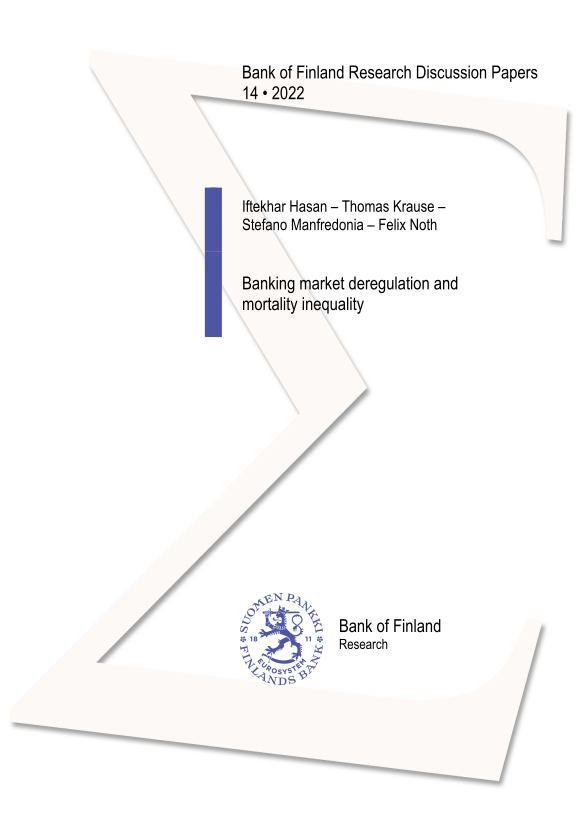
Banking Market Deregulation and Mortality Inequality
in: Bank of Finland Research Discussion Papers, No. 14, 2022
Abstract
This paper shows that local banking market conditions affect mortality rates in the United States. Exploiting the staggered relaxation of branching restrictions in the 1990s across states, we find that banking deregulation decreases local mortality rates. This effect is driven by a decrease in the mortality rate of black residents, implying a decrease in the black-white mortality gap. We further analyze the role of mortgage markets as a transmitter between banking deregulation and mortality and show that households' easier access to finance explains mortality dynamics. We do not find any evidence that our results can be explained by improved labor outcomes.
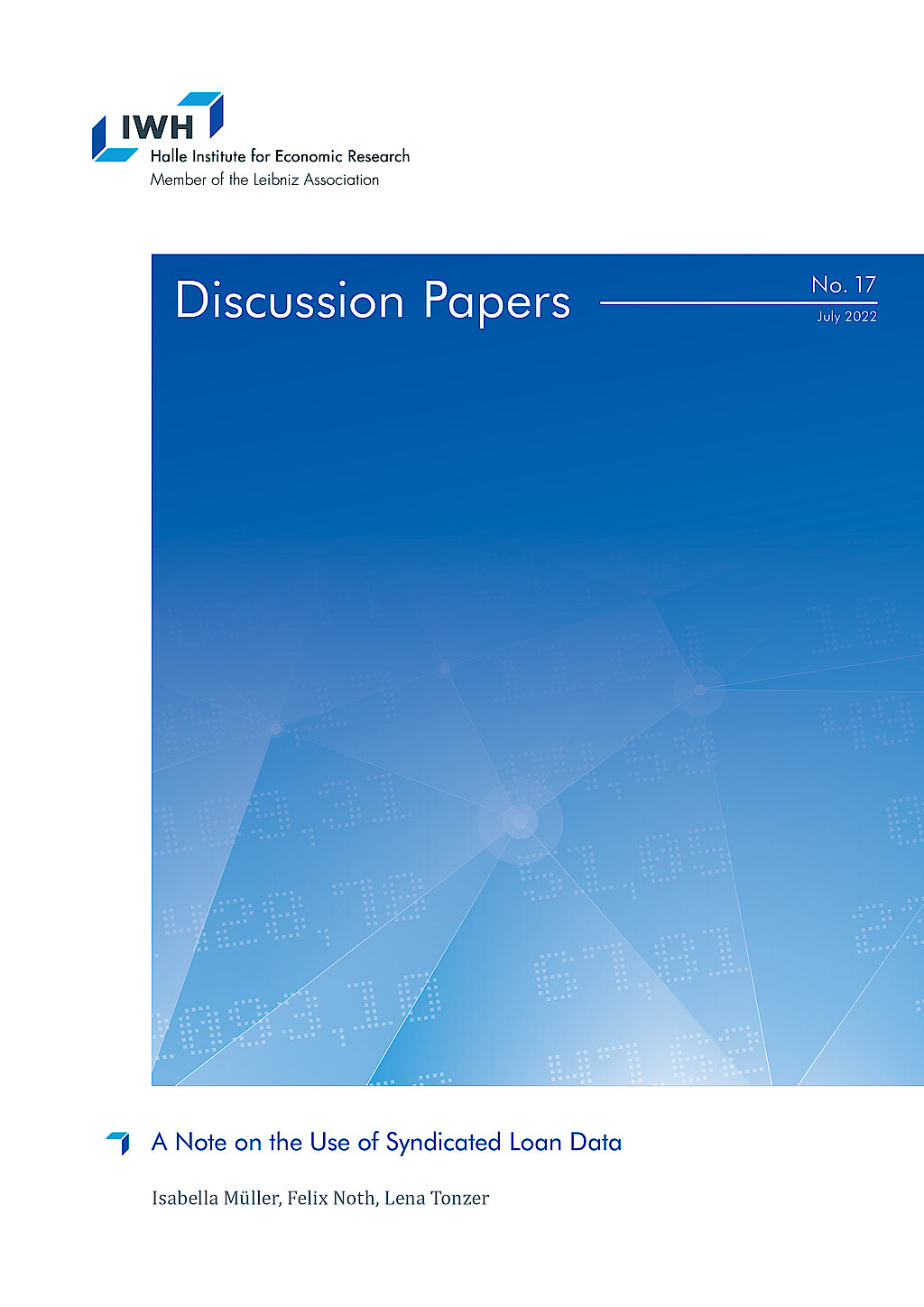
A Note on the Use of Syndicated Loan Data
in: IWH Discussion Papers, No. 17, 2022
Abstract
<p>Syndicated loan data provided by DealScan is an essential input in banking research. This data is rich enough to answer urging questions on bank lending, e.g., in the presence of financial shocks or climate change. However, many data options raise the question of how to choose the estimation sample. We employ a standard regression framework analyzing bank lending during the financial crisis of 2007/08 to study how conventional but varying usages of DealScan affect the estimates. The key finding is that the direction of coefficients remains relatively robust. However, statistical significance depends on the data and sampling choice and we provide guidelines for applied research.</p>



















